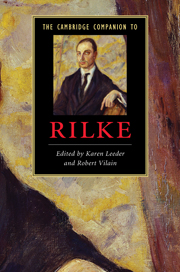Book contents
- Frontmatter
- Introduction
- PART I LIFE
- PART II WORKS
- PART III CULTURAL CONTEXTS, INFLUENCES, RECEPTION
- 8 Rilke and modernism
- 9 Rilke the reader
- 10 Rilke and the visual arts
- 11 Rilke: thought and mysticism
- 12 Rilke and his philosophical critics
- 13 Rilke’s legacy in the English-speaking world
- Appendix: Poem titles
- Guide to further reading
- Index
- Index of works
12 - Rilke and his philosophical critics
from PART III - CULTURAL CONTEXTS, INFLUENCES, RECEPTION
Published online by Cambridge University Press: 28 July 2010
- Frontmatter
- Introduction
- PART I LIFE
- PART II WORKS
- PART III CULTURAL CONTEXTS, INFLUENCES, RECEPTION
- 8 Rilke and modernism
- 9 Rilke the reader
- 10 Rilke and the visual arts
- 11 Rilke: thought and mysticism
- 12 Rilke and his philosophical critics
- 13 Rilke’s legacy in the English-speaking world
- Appendix: Poem titles
- Guide to further reading
- Index
- Index of works
Summary
In a groundbreaking essay in 1966, Käte Hamburger noted that the interest of philosophers in Rilke's work is no accident. Her point is carefully formulated: it is not that the answerable style of Rilke's poetry makes it sympathetic to philosophical interrogation, but rather that by avoiding explicitly conceptual forms it is able to respond in its own terms to philosophical positions. In this essay I focus on engagements with Rilke's poetry in the philosophical work of Heidegger and Maurice Blanchot; and, responding to them, in the criticism of Paul de Man.
Stefan Zweig - Robert Musil
Long before this philosophical interest, however, Rilke's poetic vision provoked sophisticated responses among his contemporaries. Perhaps the most penetrating early account of the New Poems is Stefan Zweig's review in the Literary Echo (Das literarische Echo) at the end of 1908. Observing a transition from musicality to plasticity via certain painterly qualities in The Book of Images (1902, 1906), Zweig finds a new strength and immediacy in poems that present 'a singular thing, like a drop of water held up as a mirror against the sky, an object that a single second enriches with all the life of its surroundings, a shard of the everyday set in its place within the inordinate'. Much here is prescient. The sound effects of Rilke's verse will become a crucial consideration for de Man's critique, for instance. Zweig notes how an inert object or a fragmentary moment is seen as a richly social event, illustrated by his only quotation from the poems.
- Type
- Chapter
- Information
- The Cambridge Companion to Rilke , pp. 174 - 188Publisher: Cambridge University PressPrint publication year: 2010
- 1
- Cited by



